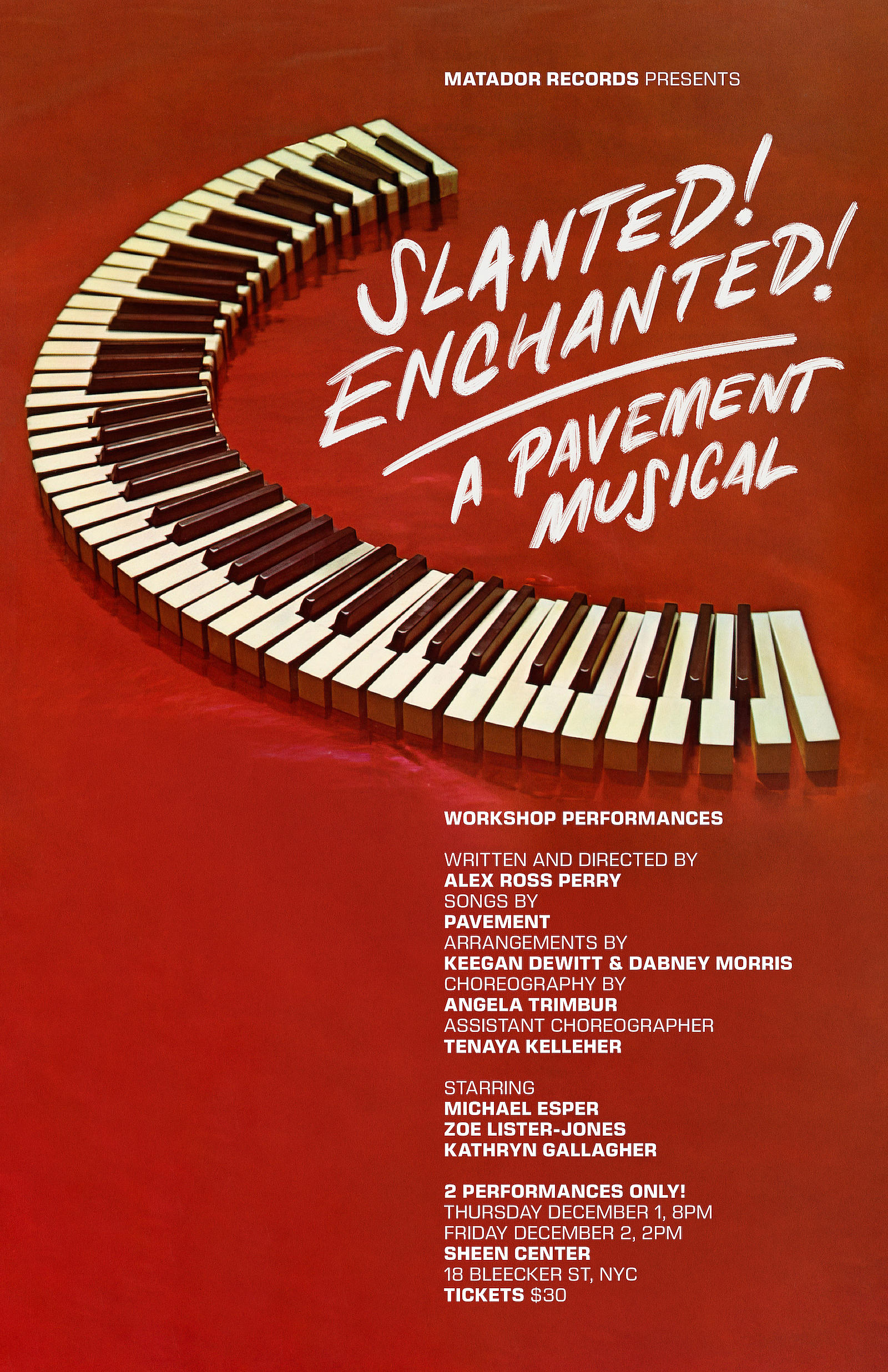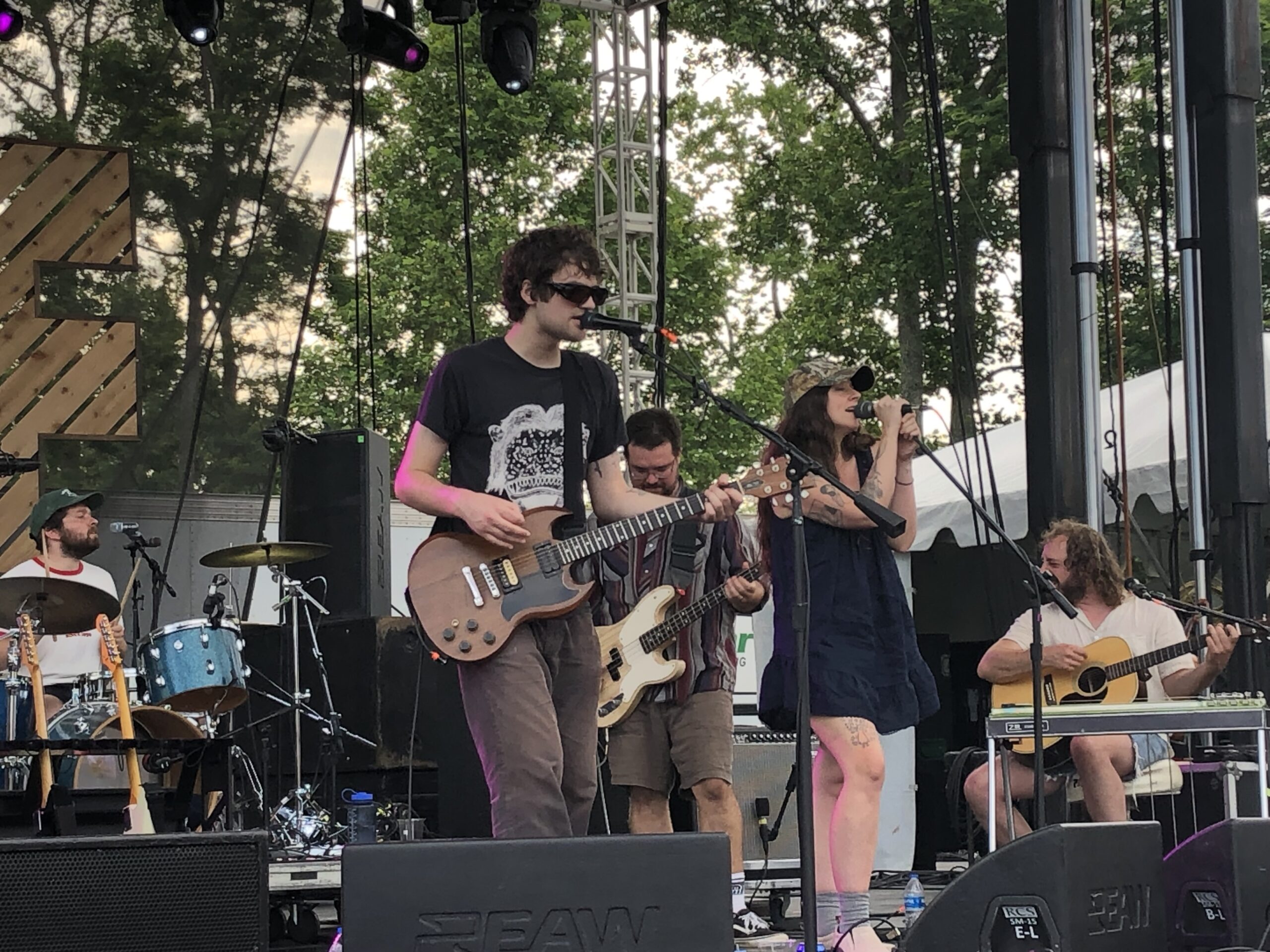If you've ever wanted to see a dance ensemble writhe on the floor to "Summer Babe" or twerk to the Pacific Trim EP, then Alex Ross Perry's new Pavement musical Slanted! Enchanted! may be the ticket for you. For a brief three-day engagement at the Sheen Center — a 273-seat theater tucked away in NoHo, billed as "New York's leading Catholic center for artistic expression and intellectual engagement" — Perry contorted Pavement's catalog into kicklines, jazz hands, and square dancing. Like Pavement's albums, it was hard to tell how much of the play was an earnest sendup of a beloved band or simply a joke on the audience itself.
I tried to modulate my expectations as I approached the theater on Wednesday; Matador's description ("The majesty and mystery of Pavement brought to life") seemed almost laughably vague. After a bit of waiting around in a crowded lobby, the audience — split between the film world and the theater world, the former easily distinguished by trucker hats and flannels — was let into the theater as Pavement deep cuts boomed over the speakers. (Admittedly, I was smitten when I heard my current favorite song, "Home," immediately upon entering.)
The set resembled a perfectly shabby basement straight out of Beavis And Butt-Head — a brown couch, wood-paneled walls, and of course, dozens of Pavement posters taped up haphazardly. Its aesthetic recalled the Pavement Museum that popped up in New York City during the band's four headlining shows in October, which Perry also curated. Both projects are allegedly part of a larger Pavement quasi-documentary from Perry, who also recently directed the music video for "Harness Your Hopes." The museum's collection of fake "artifacts" — a "READ" poster they never posed for, a set of mud-strewn clothes from a show gone wrong — were small clues in a larger, stranger narrative that blurred the factual and fictional.
At times, the play felt like a ruse for a larger performance involving the audience itself. There were technical difficulties early on, which led to an awkward 10-minute pause between the standard announcement to silence our phones and the actual beginning of the show. The multiple cameras staged throughout the theater panned towards the bemused crowd while we waited for the play to start. The vibe was Death Grips at Lollapalooza. Was the delay intentional? Were we fools to think that Pavement would approve a musical? But the lights finally dimmed, and we all took our seats, waiting to be enchanted.
The play opens on "Essem" (get it, like S.M., like Stephen Malkmus?), a disheveled rockstar played by Michael Esper, jamming on an unplugged electric guitar to "You're Killing Me." Esper, a veteran of rock musicals like American Idiot, was a good fit for the role, with a voice that rang out clearly without losing the fundamental slacker quality of Malkmus' drawl. The next song, "Box Elder," established the setting — a restless guitarist looking to "get the fuck out of this town." It also introduced Essem's first love interest, the winsome and twee "Anne" (get it, like "Ann Don't Cry"), played by Zoe Lister-Jones, as well as the ensemble, who danced throughout the night with the manic energy of a child actor held at gunpoint. "None of them even looked like Pavement fans," my friend pointed out after the show. She was right — I've never seen a Pavement fan do a box step with a smile plastered across their face.
The entire dialogue of the play was made up of Pavement's discography, from the hits to obscure deep cuts. They traversed an impressive 30 songs in the hour-long performance, cutting each off after a verse or two before jumping immediately into the next song. The plot, as much as there was one, followed Essem from small-town rocker to the bright lights of the big city, where he meets "Loretta" (get it? Like "Loretta's Scars"), a leather-clad hardened punk played by Kathryn Gallagher and a clear foil to Anne in her Peter-Pan-collared dress. They fall in love (during a lap dance set to "In The Mouth A Desert," of course), he leaves Anne for fame, glamor, and Loretta ("Cut Your Hair"), and he subsequently spends the rest of the play trapped in a tedious love triangle between the two. But the story felt incidental to the absurdities surrounding it—the tap dancing Santas during "Gold Soundz," ribbon twirling to "Ann Don't Cry," and riding Ikea shopping carts during "Date With Ikea." The Pavement songs felt like casualties, like they were fighting a losing battle against a thespian enthusiasm they never asked to compete with in the first place.
This was the first night of the show — for friends and family and assorted media types, not for the public — which explains why Perry was seen running around theater checking for sound issues while beaming like a high school senior who got to direct the spring musical for his last semester. It's not that the actors were flat or underwhelming — Gallagher in particular gave "Loretta" a dose of swagger and confidence, despite battling sound issues throughout. But Pavement — the band, the music, the lore — is the opposite of a highly choreographed, enthusiastically performed theatrical revue. "Spit On A Stranger," the closing song before a final, painfully strained Pavement medley, is beautiful because of its restraint — the way Malkmus' voice almost cracks in his falsetto, or shaggy drums that can barely keep the beat. Some songs were just never meant to be performed in a four-part harmony by overeager actors shouting to the back of the crowd. Pavement songs buckle under the weight of body rolls and interpretive dance.
Maybe the awkwardness is the point. Maybe it'll all make sense in the context of some forthcoming Pavement mockumentary. But the image of half a dozen cowboys do-si-doing to "AT&T" was tragically real; if I never listen to Wowee Zowee the same way again, I'm blaming Perry.
We rely on reader subscriptions to deliver articles like the one you're reading. Become a member and help support independent media!






